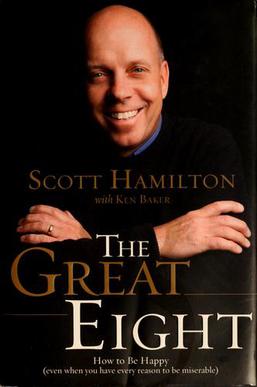The Great Eight (book)
The Great Eight: How to Be Happy (Even When You Have Every Reason to be Miserable) is a self-help book authored by Scott Hamilton, an Olympic gold medalist in figure skating. The book, published in 2009, delves into Hamilton's personal journey and the strategies he employed to find happiness and fulfillment despite facing numerous challenges, including a life-threatening battle with cancer and the early loss of his mother. Through The Great Eight, Hamilton shares his insights and lessons learned, aiming to inspire and guide readers towards achieving happiness in their own lives, regardless of the obstacles they may encounter.
Overview[edit | edit source]
The Great Eight is structured around eight key principles that Scott Hamilton identifies as essential to finding and maintaining happiness. These principles are derived from his personal experiences, struggles, and triumphs. Each chapter of the book is dedicated to one of these principles, offering readers a mix of personal anecdotes, practical advice, and motivational messages. Hamilton's approach is both relatable and uplifting, making the book a compelling read for those seeking to overcome adversity and find joy in their lives.
Key Principles[edit | edit source]
The book outlines the following eight principles as the foundation for happiness:
- The Right Attitude - Emphasizing the importance of maintaining a positive outlook on life.
- The Power of Faith - Discussing how faith can provide strength and guidance during difficult times.
- The Choice to Move Forward - Encouraging readers to take proactive steps towards their goals and dreams.
- The Heart of a Champion - Highlighting the value of perseverance and resilience in achieving success.
- Using Adversity for Advantage - Teaching readers to transform challenges into opportunities for growth.
- The Joy of Giving - Advocating for the importance of generosity and kindness in enriching one's life.
- The Virtue of Patience - Stressing the significance of patience in personal development and achieving long-term goals.
- The Power of Love - Concluding with the message that love, in its various forms, is the ultimate key to happiness.
Reception[edit | edit source]
The Great Eight has been well-received by readers and critics alike for its heartfelt advice and the authenticity of Scott Hamilton's narrative. His unique perspective as an Olympic athlete who has faced significant personal and health challenges adds depth and credibility to his advice on overcoming adversity and finding happiness.
Impact[edit | edit source]
The book has not only served as an inspirational guide for individuals seeking to improve their personal well-being but has also been used by motivational speakers and in self-help seminars as a tool for teaching resilience, positivity, and the pursuit of happiness.
See Also[edit | edit source]
Search WikiMD
Ad.Tired of being Overweight? Try W8MD's physician weight loss program.
Semaglutide (Ozempic / Wegovy and Tirzepatide (Mounjaro / Zepbound) available.
Advertise on WikiMD
|
WikiMD's Wellness Encyclopedia |
| Let Food Be Thy Medicine Medicine Thy Food - Hippocrates |
Translate this page: - East Asian
中文,
日本,
한국어,
South Asian
हिन्दी,
தமிழ்,
తెలుగు,
Urdu,
ಕನ್ನಡ,
Southeast Asian
Indonesian,
Vietnamese,
Thai,
မြန်မာဘာသာ,
বাংলা
European
español,
Deutsch,
français,
Greek,
português do Brasil,
polski,
română,
русский,
Nederlands,
norsk,
svenska,
suomi,
Italian
Middle Eastern & African
عربى,
Turkish,
Persian,
Hebrew,
Afrikaans,
isiZulu,
Kiswahili,
Other
Bulgarian,
Hungarian,
Czech,
Swedish,
മലയാളം,
मराठी,
ਪੰਜਾਬੀ,
ગુજરાતી,
Portuguese,
Ukrainian
Medical Disclaimer: WikiMD is not a substitute for professional medical advice. The information on WikiMD is provided as an information resource only, may be incorrect, outdated or misleading, and is not to be used or relied on for any diagnostic or treatment purposes. Please consult your health care provider before making any healthcare decisions or for guidance about a specific medical condition. WikiMD expressly disclaims responsibility, and shall have no liability, for any damages, loss, injury, or liability whatsoever suffered as a result of your reliance on the information contained in this site. By visiting this site you agree to the foregoing terms and conditions, which may from time to time be changed or supplemented by WikiMD. If you do not agree to the foregoing terms and conditions, you should not enter or use this site. See full disclaimer.
Credits:Most images are courtesy of Wikimedia commons, and templates Wikipedia, licensed under CC BY SA or similar.
Contributors: Prab R. Tumpati, MD

